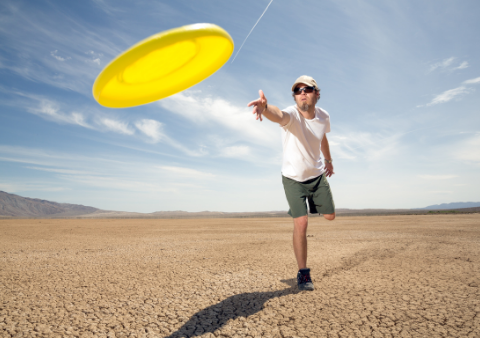Rules of Disc Golf
Disc golf is one of the most popular types of golf. Disc Golf has a complete and strict set of formal rules envisaged by the Professional Disc Golf Association. The main aim of disc golf is to enjoy and have fun as you try completing the course with as few throws as possible. Safety and courtesy are vital. In a nutshell, while throwing, be careful about the landing area. Ensure not to cause inconveniences to animals, plants, and people nearby. Equally, rules of disc golf mind about the safety of the fellow players.
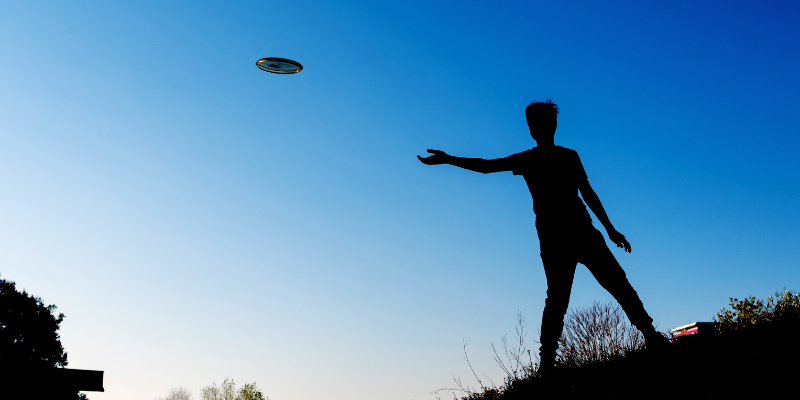
Frisbee golf rules aim to ensure fair play in the game. Each player must apply the rules depending on the situation at hand. If these rules fail to address the problem at hand, the rules of fairness shall apply. These rules dictate that every player is responsible for calling out promptly whenever other players violate these rules. Here below are the disk golf rules in detail.
Courtesy Rules
- Players should not throw until they are sure that the disc does not hurt anyone, interfere with other players, and do anything capable of distracting others. Equally, other players should watch their fellow players throw to aid in locating the area and compliance with the rules.
- Players should avoid any unnecessary noise or any potential visual distractions not to distract other players while throwing. Examples of such actions include shouting, slapping course equipment, among others.
- Players must undertake to perform actions per the rules failure to which shall be deemed a violation. Such actions include moving discs or equipment, a search of lost discs, and keeping scores appropriately.
- Players should not litter where they play.
- Courtesy outlines that players who smoke must employ reasonable care not to cause disturbance to the players that don’t smoke.
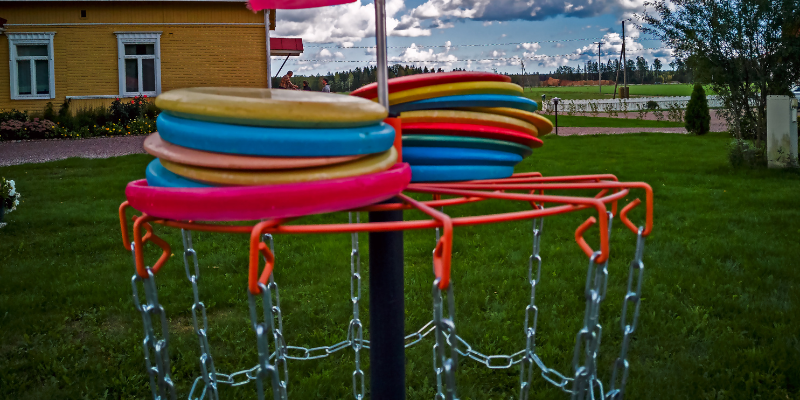
Order of Play
- Teeing on the initial teeing place follows order which depends on the records of the scorecards or the way players appear on the scorecards.
- The scores of the previous hole determine teeing of the subsequent tees. The one with the least score throws first in that order.
- After the completion of throwing by all players, the player farthest from the hole begins again. Sometimes a player who is not farthest from the hole may play provided consent has been given by the players farthest from the hole.
- In cases of tournaments, the leading group plays first unless the rules dictate otherwise.
- Disc golf for beginners dictate the following;
- Players must know when to release the disc. They should focus on keeping the disc low and flat.
- And players must develop a practice routine to master all the golf rules.
- Players should begin practicing with a few discs to enhance their skills.
- Players should practice basic techniques.
Frisbee Golf Rules – Excessive Time
- Rules of disc golf allow 30 seconds for each player to throw after:
- The previous has thrown, the player has taken considerable time to reach the disc and mark the lie, and the playing arena is clear without distractions.
- A player shall receive a warning for the excessive time violation. If two or more players observe these violations, there shall be a penalty throw for each subsequent round of time violation.
Discs Used In-Play
The discs to use in the play must meet all the conditions set under Professional Disc Golf Association.
- Cracks and perforations make the disc illegal. If the disc cracks during the tournament, players can carry it; however, they must declare their intention to carry the disc. Otherwise, rules of the golf disc allow for the penalization of such players.
- The director is in charge of approving discs. The director shall ascertain whether violations exist regarding the disc. If the disc does not meet the conditions given by the director, it shall be deemed illegal.
- Any player found in the custody of an illegal disc is subject to two penalty throws. In addition, any player that throws an illegal disc twice shall be subject to disqualification.
- Except for the mini marker discs, all the other discs should have unique marks or ink pigmentation. If other players or the group observe a player throwing a disc with no distinctive marks, the player shall be penalized for that.
Artificial Devices
- Except for the devices that control or reduce abrasions, such as gloves, bandages, and medical tools such as ankle braces, the rest of the items shall not be allowed in the pitch. It is against the rules of disc golf for any player to use any other devices to assist in throwing the disc. Equally, any devices that help change positions, such as GPS devices, are not allowed while throwing.
- Any player caught by other players or officials carrying artificial devices while throwing shall receive two penalty throws without warning.
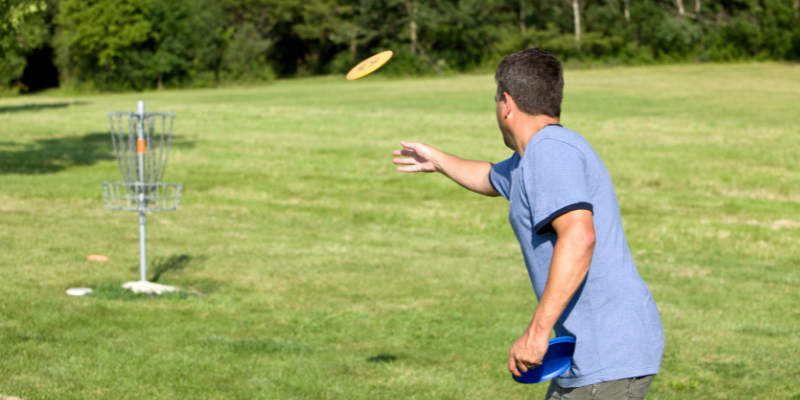
General Rules – How to play disc golf?
- Interpretation of the game. It comprises throwing a flying disc from the teeing area to the target area. Players play the course as they get it and disc where it lies.
- Practice Throws. Any player who throws a practice or an extra throw using any disc before his finishing time violates the rules of disc golf. On the same note, disk golf rules envisage making fair throws should directly be from behind the lie.
- Appeals.
- A thrower shall enjoy the benefit of the doubt if the group of players is unable to make a ruling.
- All groups shall pave the way to let the officials make decisions.
- If there is an issue and the official is absent, the group continues in the following ways. Firstly, the groups may decide to give the benefit of the doubt to the thrower, or the use of provisional throws shall be valid.
- If a player disagrees with the official’s decision, he can appeal to the director.
- Rules of fairness. If formal rules do not cover a dispute in contestation, the rules of fairness shall apply. For instance, any close existing rule shall aid in coming up with the fairness rules.
- Warnings. A player only receives warnings if the rules of disc golf stipulate so.
Teeing Off
- The play shall commence on every hole, and players shall throw within the teeing area. There shall be a violation of any supporting point contact outside the teeing area.
Interference
- A thrown disc that hits fellow players, animals, plants, or anyone around the designated area forms an interference. Any thrown disc that a player intentionally throws shall be marked by other players, officials, and the group. It is important to note that only the unintentional throws shall attract rethrows.
- If a player moves a disc from its initial positions or the resting surface and players or the group observe this, it shall be considered interference.
Mandatories
- A mandatory limits the path the disc may follow to the target. A disc must go through the correct route before completion. If the disc successfully passes through the mandatory line, an automatic ignorance of the mandatory suffices. A mandatory line is a line marked by the director or the course designer to show when the passage of the disc occurred. If the director or the course designer fails to mark the mandatory line, the path followed by the disc shall be a straight line.
- If a throw passes via the incorrect mandatory line, then such a throw is invalid.
- A disc that misses the mandatory results is known as a one-throw penalty.
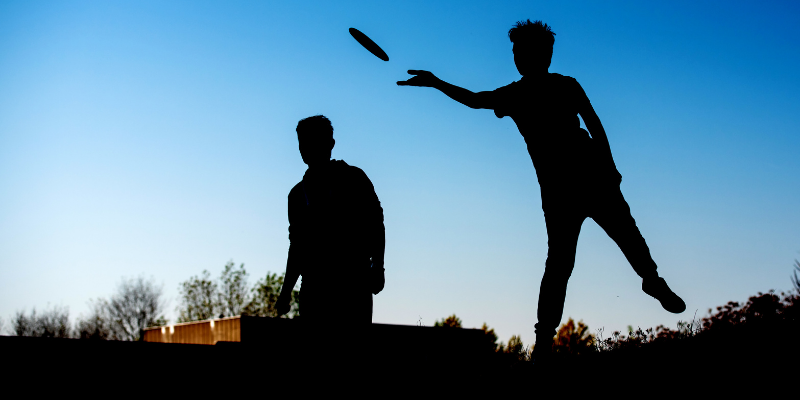
Disc Golf Rules – Lost Discs
- A disc is declared lost if a player fails to locate it within the first three minutes after arriving at the area where an official or the group last saw the disc. An official or any two players shall time until the lapse of three minutes. Other players may assist in searching the disc before the beginning of three minutes after the ball has lost.
- Any player whose disc is lost shall receive a throw penalty. If the player makes a throw from the tee, he shall re-tee for the next shot.
- If officials discover removal of the disc from its original spot, the player culpable shall receive a two-throw penalty.
Holing Out
- Any player that fails to play the game or fails to hole out the disc shall be subject to disqualification by the director under the following terms:
- Firstly, if the player misses the holes due to late arrivals shall attract disqualification.
- If the player unintentionally fails to hole out as determined by the official or a group majority shall attract a two-throw penalty.
- If a player intentionally fails to hole out, he shall be subject to withdrawal from the tournament or competition.
- Before the player holes out, he must release the disc, and it must come to rest with the support of chains or the poles. If the official or a group of players observe and find out that the disc did not enter the right target, there shall be a lack of hole out. Sometimes, the disc may enter above or at the bottom of the chain support, and such circumstances call for invalidation of holing out.
Rules of Disc Golf – Conclusion
There are various rules for disc golf that cut across both golf experts and beginners. The formal Frisbee golf rules address all the events, including interpretation of the golf game and lost discs. However, if these formal rules fail to solve a dispute, rules of fairness come into play. Rules of fairness solve the dispute by looking at the closeness and logic of the dispute with the existing rules. When players master the rules at their fingertips, playing golf becomes enjoyable.
